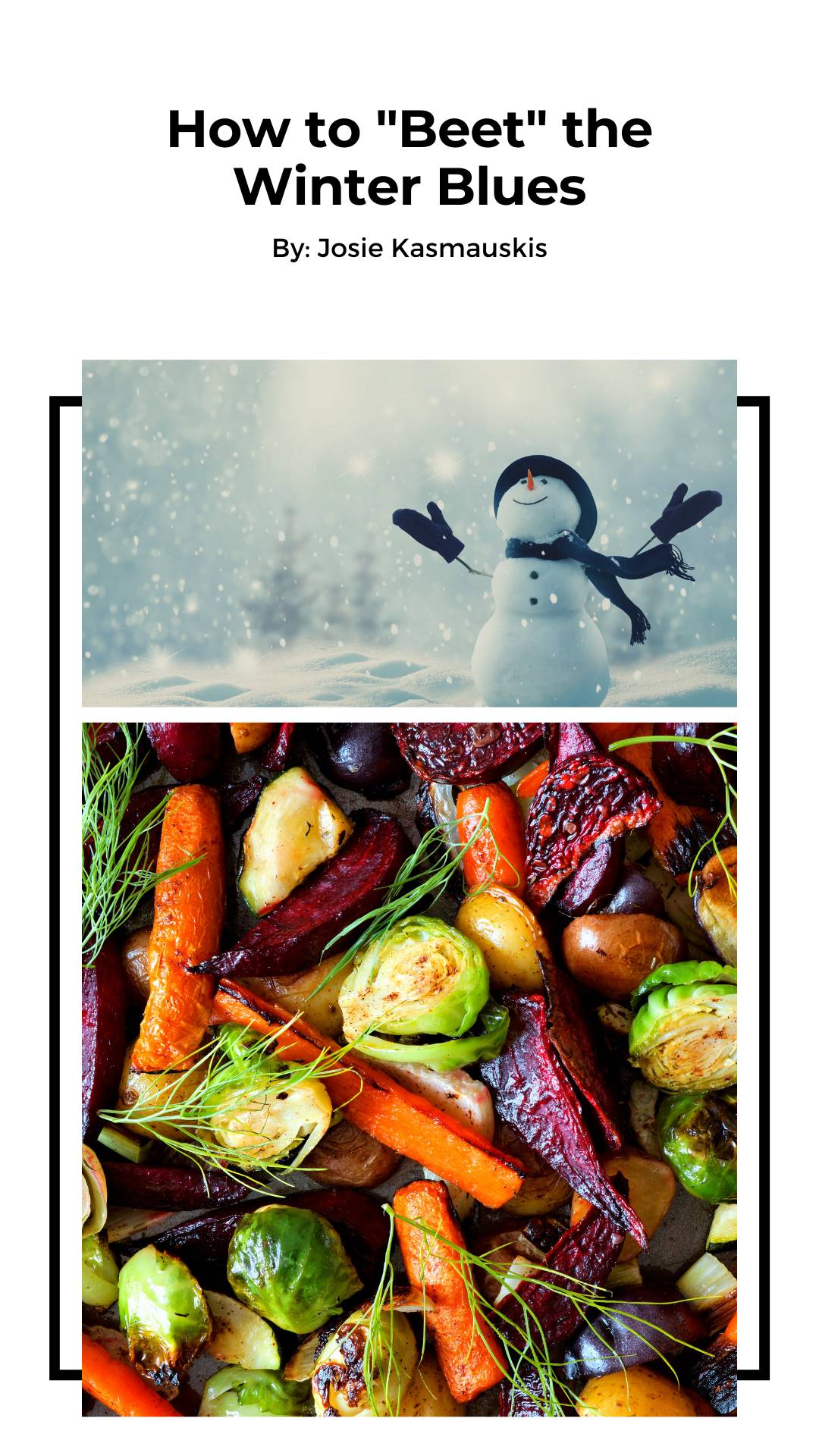Blog
Permanent link for How to "Beet" the Winter Blues on February 21, 2022
Can Food Really Affect Your Mood?
Are you getting a little tired of the endless cloudy Michigan skies? Has it been hard to focus on homework…spring weather in your daydreams? Maybe falling snow has lost its charm. Maybe you’re starting to think the lake effect is more like the lake de fect. Well you are not alone– according to a psychiatry journal, about 46 million Americans (18 and older) experience a gloomy winter.
The good news is that what you lick off your spoon (or fork) can be a game changer for your mood. Neurotransmitters are little signals in the brain that impact the way you feel and can be affected by different nutrients found in food. There are so many tiny vitamins (like B12 and B6) or other nutrients (like folic acid and tyrosine) that can make a big difference!
5 Foods to Help Lift Moods
- Did the title give it away? Beets are one of the many great options to lift your mood. Their bright color isn’t the only exciting part about them. They contain nitrates that can decrease blood pressure and increase oxygen. Choline found in beets is a key helper for making one of those neurotransmitters (the tiny signals important for mood) in the brain. Other benefits of beets include memory help, decreased chance of heart disease, and decreased inflammation.
- Winter squash is a seasonal favorite that is a mood favorite too. The vitamin B6 it contains is extremely important for keeping a good mood, not to mention all the fun varieties. Butternut, spaghetti, delicata and many others are all part of the clan that can give you a vitamin B6 boost. Pumpkin, another squash family member, not only contains vitamin B6 but also magnesium. Magnesium is an important mineral that could lower symptoms of depression.
- Bananas, like squash, have high amounts of vitamin B6. They also contain a good source of fiber which is important for the regulation of blood sugars and prevent energy roller coasters. They also contain prebiotics (note: not probiotics) which good bacteria thrive on in the gut. For more information on gut health visit one of our previous blog posts Mind-Gut Connection.
- Sweet potato, another orange vegetable variety, has vitamin C. Not only do these golden potatoes have the potential of lowering depression symptoms, they also have the ability to lower inflammation, another important aspect of mood. As you might already know, vitamin C can additionally support the immune system, a little bonus during the cold seasons.
- Brussels sprouts are another amazing option. Maybe not your first choice, but you don’t want to miss out on all the folic acid brain-mood booster qualities they can provide.
So Many to Choose From!
There are many other foods that can boost your mood. Some general options include:
- Foods high in fiber
- Whole grains
- Fish
- Eggs
- Legumes (lentils/beans)
- Potatoes (the skin is the best part!)
- And many other fruits/vegetables besides those previously mentioned
Visit this Healthline website for more foods that can help with mood.
Slip It In
With so many options it might be overwhelming to think about how to get all of it into your diet. It’s important to remember, however, that you don’t need to eat them all at once. Maybe start by trying to incorporate one of these foods into a meal each week. You can always keep adding them in as it becomes easier. Furthermore, there are so many possibilities and ways to eat them it might take a little experimentation to see what makes your taste buds dance. Frozen, canned, shredded, sauteed, blended, baked, microwaved, chopped or any combination– your brain and mood don’t mind how it comes.
Some Specific Examples of How to Include
One low-cost easy way to get pumpkin in your diet is to buy 100% canned pumpkin puree. You could add it to your oatmeal, overnight oats or to a smoothie. Add shredded brussels sprouts to a stir fry, salad or soup. Skewering a few beets from a jar and eating them right off the fork is always a tasty snack. If you have access to raw beets, shred them for a colorful salad or roast some beets in the oven. Maybe grab a banana with some spare dining dollars. Simply thinking of ways to eat them could put you in a better mood!
There are also many resources online to help inspire you. Epicurious is a website and app. You can customize your search results for the specific food, type of meal, allergies, level of difficulty and much more!
Winter Doesn’t Have to be a Downer
Food may not be the first idea that comes to mind when trying to solve seasonal blues, but it clearly can have an impact. Enhancing your menus with some beets, bananas, squash, sweet potatoes or brussels sprouts has shown to boost mood and turn winter blues into reds, yellows and oranges. Keeping in mind some of these food ideas and having fun making up your meals are some first steps to keep you smiling through the end of March.
Don’t Hesitate
If seasonal depression is becoming unbearable, don’t hesitate to book a free consultation with the counseling center at GVSU. Or, if you need some more nutrition advice, and/or have some other wellness goals in mind there are many other resources on the Recreation and Wellness page. Want to ask an anonymous question? Our WIT Peer Educators are happy to answer questions on Ask WIT. The newest program called Wellness Navigators could even give you free one-on-one guidance!
By: Josie Kasmauskis, WIT Peer Educator
Categories:
General Wellness
Nutrition
Posted
by
Katie Jourdan
on
Permanent link for How to "Beet" the Winter Blues on February 21, 2022.

